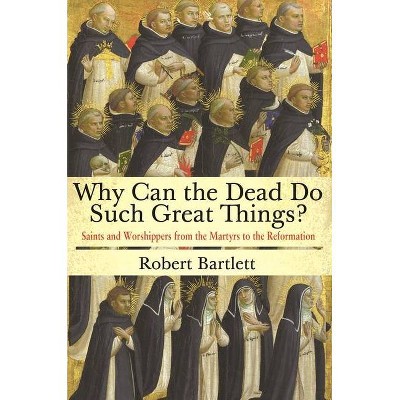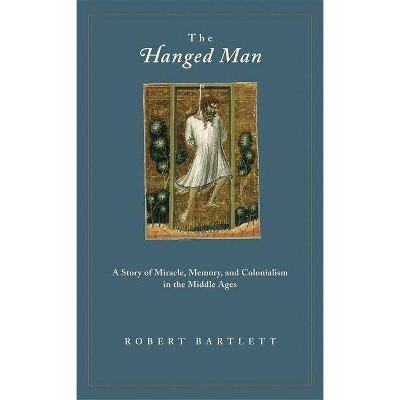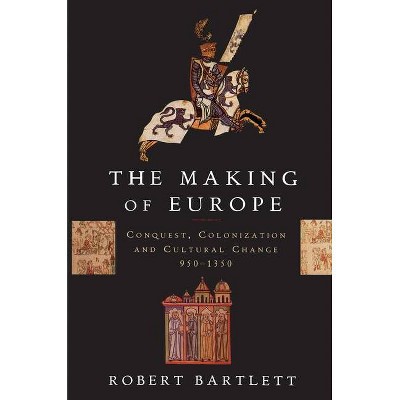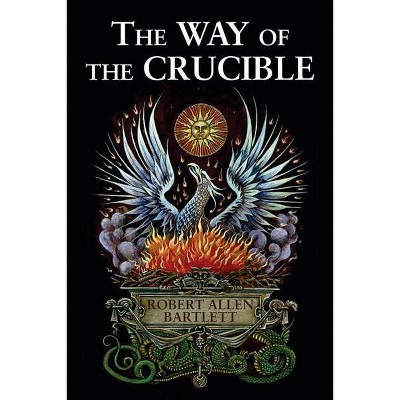Why Can the Dead Do Such Great Things? - by Robert Bartlett (Paperback)

Similar Products
Products of same category from the store
AllProduct info
<p/><br></br><p><b> Book Synopsis </b></p></br></br><p><b>A sweeping, authoritative, and entertaining history of the Christian cult of the saints from its origin to the Reformation</b> <p/>From its earliest centuries, one of the most notable features of Christianity has been the veneration of the saints--the holy dead. This ambitious history tells the fascinating story of the cult of the saints from its origins in the second-century days of the Christian martyrs to the Protestant Reformation. Robert Bartlett examines all of the most important aspects of the saints--including miracles, relics, pilgrimages, shrines, and the saints' role in the calendar, literature, and art. <p/>The book explores the central role played by the bodies and body parts of saints, and the special treatment these relics received. From the routes, dangers, and rewards of pilgrimage, to the saints' impact on everyday life, Bartlett's account is an unmatched examination of an important and intriguing part of the religious life of the past--as well as the present.</p><p/><br></br><p><b> From the Back Cover </b></p></br></br><p>"The whole of medieval life is contained in Robert Bartlett's history of the cult of saints. Wisely combining a chronological account and thematic explorations, Bartlett surveys the whole of Europe and its vastly diverse people. This is a remarkable feat that takes the medieval passion for saints and their relics not as a given, but as an intellectual challenge. Bartlett shows that as Christian Europe lost the ancient gods of nature it gained a landscape marked by those great things that only very special dead people could do."<b>--Miri Rubin, Queen Mary University of London</b></p><p>"This massive and encyclopedic survey is a remarkable guide to the complexities of medieval sanctity. It is so hard for modern readers to understand the role of medieval saints from within; this book makes it possible."<b>--Chris Wickham, University of Oxford</b></p><p>"This is a great book, a bold work by an outstanding scholar and writer. Tackling the vast subject of medieval sainthood, Robert Bartlett has managed to produce a distinctly original account that is also an enjoyable and entertaining read, seasoned with humor. Bartlett has a keen eye for significant, and often paradoxical, quotations, situations, and personalities. I know of no other book that has attempted to grasp the entire subject of medieval sainthood. Its publication is a major event."<b>--Gábor Klaniczay, Central European University</b></p><p>"Comprehensive, up-to-date, and highly readable, this ambitious survey of medieval sainthood is, in its scale and range, unlike any other book on the subject. Robert Bartlett successfully balances an astute analysis of the underlying and universal dynamics driving the medieval conception of, and response to, sanctity, with an imaginative depiction of chronological and regional variation and particularity. And he has a remarkable eye for telling and offbeat details. This is major book."<b>--Alan Thacker, University of London</b></p><p/><br></br><p><b> Review Quotes </b></p></br></br><br><i>Why Can the Dead Do Such Great Things</i> is an excellent survey of the cult of the saints in the pre-modern period. The reader looking for explanations of the social and cultural functions of the holy dead could do far worse.<b>---Frank McGough, <i>Origins</i></b><br><br>[A]n indispensible point of departure for anyone interested in the cult of the saints in the Middle Ages. The book is based on an awe-inspiring familiarity with the hagiographical sources of both Eastern and Western churches, and is packed with intelligent, measured, and well-informed discussions of everything from the hierarchy of precedence of feasts in the old Roman calendar to the managerial problems of running a shrine. Students, scholars, and the general reader will all find it invaluable.<b>---Eamon Duffy, <i>New York Review of Books</i></b><br><br>[M]agisterial. . . . [A] fascinating and illuminating read. . . . Bartlett's book will also be welcome to those who have experienced something of the power of the cult of the saints in their own time and place. . . . [H]is style balances rigor and a near-encyclopedic breadth with accessibility and humor. . . . <i>Why Can the Dead Do Such Great Things?</i> will remain a classic study of the saints, their cults and their faithful for a long time. . . . Robert Bartlett's masterpiece.<b>---Holly J. Grieco, <i>America</i></b><br><br>[M]assive, erudite compendium of saint lore . . . For a book so deeply grounded in original research . . . The volume is remarkably accessible.<b>---Barbara Newman, <i>London Review of Books</i></b><br><br>[T]here is much to enjoy in the array of human behaviour, sacred and by our standards profane or just downright mad, chronicled in Bartlett's excellent study.<b>---Diarmaid MacCulloch, <i>Guardian</i></b><br><br>[T]his magisterial work of scholarship.<b>---Richard Holloway, <i>Independent</i></b><br><br>Bartlett convincingly explains how the 12th-century papacy sought to control a potentially anarchic process by demanding strict examination of cases, of which only about half were successful. . . . With great thoroughness, Bartlett examines issues such as types of saint, relics, miracles, hagiography and doubt, more as an observer than as judge. . . . Some of Bartlett's most valuable insights relate to the diversity of ways in which saints were revered and what they reveal about visions of the social order.<b>---Constant Mews, <i>Sydney Morning Herald</i></b><br><br>Bartlett has provided readers interested in hagiography and the medieval cult of the saints with a magisterial and wholly engrossing book.<b>---Rachel Koopmans, <i>Biography</i></b><br><br>Bartlett is not content to simply refer to the findings of others second-hand. Rather, he returns to the sources, the great majority of them in Latin, and does the spade-work himself. This particular approach, and the concern for meticulous research that it evinces, puts Bartlett's magisterial study in a different league from so many others. The result is a volume that is at once staggeringly scholarly and yet, owing to Bartlett's light touch, surprisingly accessible. No library should be without a copy.<b>---Salvador Ryan, <i>Irish Theological Quarterly</i></b><br><br>Bartlett writes with relish for his subject, tells its marvelous stories well, injects judicious doses of good humor, and leaves one with the sense that the cult of the saints is a pervasive feature of Christianity's historical texture.<b>---Anne Thayer, <i>Sehepunkte</i></b><br><br>Bartlett's work is astonishingly comprehensive, and the balance he strikes between narration and analysis is admirable.<b>---David J Collins, <i>Theological Studies</i></b><br><br>Devotion to the saints is manifestly still alive and well in the Catholic Church, and Bartlett's impressive compendium will serve to explain the cult's historical origins and evolution.<b>---John Cornwell, <i>Financial Times</i></b><br><br>In addition to being readable and fascinating, Bartlett's book forms a virtual curriculum on medieval religion in particular and medieval history in general.<b>---Thomas F. X. Noble, <i>American Historical Review</i></b><br><br>It is a treat . . . to see such erudition amassed this way; it is hard to imagine any aspect of the cult of the saints that Bartlett has left out in this extraordinarily comprehensive text. Yet there is enormous entertainment here as well. . . . [W]ho, and when and where--this enormous and humane reference work gives all that, along with stories that are appalling and ghoulish and mysterious and funny.<b>---Rob Hardy, <i>The (Columbus, OH) Dispatch</i></b><br><br>It is hard to overemphasize the scholarship evident in this book. . . . One could associate a work such as this with a certain dryness of tone but this is not the case. The book is very engaging and at the same time quite modular, that is, allowing the readers to jump around to concentrate on their areas of special interest. Bartlett is one of the world's leading medieval historians and he brings his expertise to bear on this very ambitious project.<b>---Richard Rymarz, <i>Catholic Books Review</i></b><br><br>Rich in original research, full of illuminating case studies, <i>Why Can the Dead Do Such Great Things?</i> is a major achievement from a distinguished medieval historian and a gold mine for those interested in religious history.<b>---Helen Fulton, <i>Times Higher Education</i></b><br><br>Robert Bartlett's monumental study provides a comprehensive account of the development of the cult of the saints from the cult of martyrs (those who had died as witnesses for their faith during the Roman persecutions) and illustrates the centrality of saintly devotion in the lives and beliefs of Christians across Europe over the whole medieval period. . . . Bartlett has a gift for succinct summary, both of complex (and confusing) narratives and for explaining theological controversy; his obvious abilities as a teacher appear throughout and his book will manifestly appeal to students. . . . Robert Bartlett's achievement lies in his capacity to draw out the distinctive, and often amusing, attributes of different saints while showing how the cult of saints operated in medieval Europe.<b>---Sarah Foot, <i>Times Literary Supplement</i></b><br><br>The author of this study has produced what is to this reviewer's knowledge the first textbook on the premodern cult of the saints and at--I cannot resist the temptation--a miraculously low price. Luckily, Robert Bartlett is more than equal to the task. . . . Bartlett's writing is measured and deft, as one would expect from a scholar of his caliber.<b>---David Defries, <i>The Historian</i></b><br><br>The history book I most enjoyed this year was also my first of 2014. I tucked into Robert Bartlett's <i>Why Can The Dead Do Such Great Things</i> (Princeton University Press) on New Year's Day and could not have hoped for a more stimulating festive read. A sweeping study of medieval saints, covering the entire Christian world from Late Antiquity to the Reformation, it is also a compendium of anecdotes, such as one rarely finds in a work of scholarship. Whether it be St Modwenna of Burton and her red cow, the Bishop of Lincoln who bit off two chunks of Mary Magdalene's arm, or Queen Bathildis cleaning out toilets, all of human--and much of divine--life is here.<b>---Tom Holland, <i>History Today</i></b><br><br>This is a fascinating book and one to which to return.<b>---Martin Wellings, <i>Methodist Recorder</i></b><br><br>This is a remarkable book, which is thankfully both wonderfully informative and wonderfully readable. . . . His book is just the kind of great scholarly synthesis that was once the norm, but which may well become rarer than now in the future. This is a long and very detailed book, but the patience of the reader in encompassing nearly 800 closely printed pages will be well rewarded.<b>---Peter Costello, <i>Irish Catholic</i></b><br><br>This is a very important book that offers the first comprehensive study of the cult of the saints from late antiquity to the Reformation in both Western and Eastern Christianity. Such work rests on an extraordinary knowledge of the textual and iconographic sources and of the vast scholarship that exists on these topics. . . . An impressive achievement.<b>---André Vauchez, <i>Speculum</i></b><br><br>Winner of the 2013 PROSE Award in European and World History, Association of American Publishers<br><br>Winner of the 2015 Otto Gründler Book Prize, The Medieval Institute of Western Michigan University<br><br>With this book Robert Bartlett serves up a wondrous synthesis: awesome in its breadth, saturating in its detail, and delightful in its humanity. . . . This is a book that has a long reach and should hold a place in every medievalist's library.<b>---Anne E. Lester, <i>Catholic Historical Review</i></b><br><p/><br></br><p><b> About the Author </b></p></br></br>Robert Bartlett is professor of mediaeval history at the University of St. Andrews in Scotland.
Price History
Price Archive shows prices from various stores, lets you see history and find the cheapest. There is no actual sale on the website. For all support, inquiry and suggestion messages communication@pricearchive.us




















